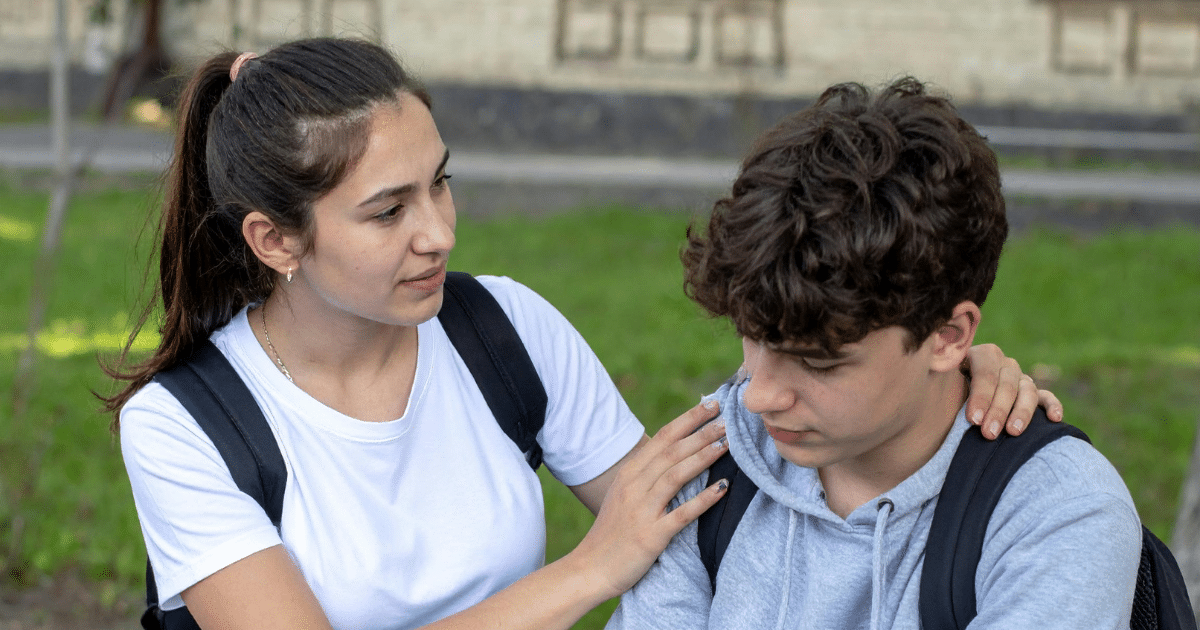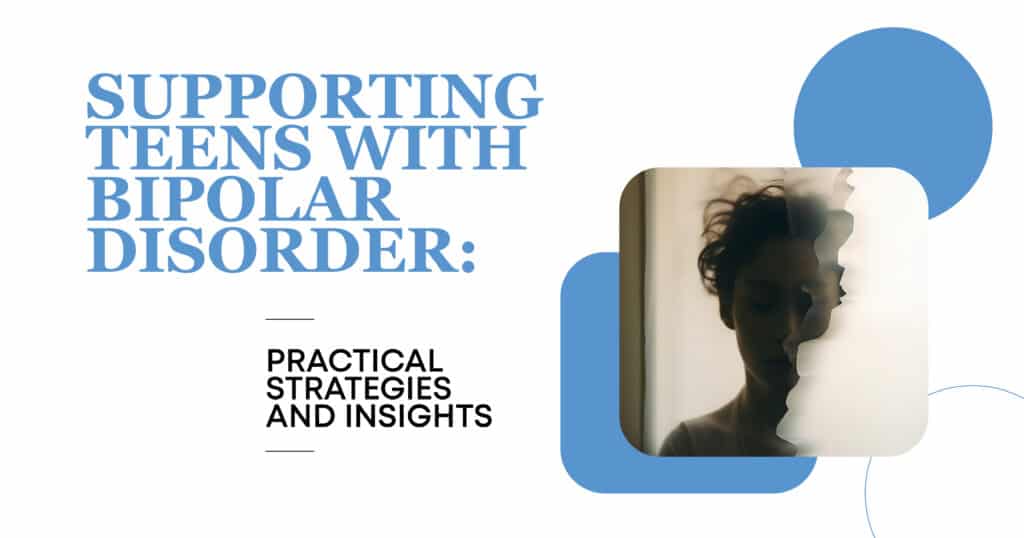Helping your child manage bipolar disorder can feel overwhelming. As a parent, you may constantly wonder how to help teens with bipolar disorder and navigate the emotional challenges that come with it. Understanding and identifying the signs of bipolar disorder is often the first hurdle. Teens, especially during their adolescent years, can experience mood swings that seem typical of teenage behavior, such as irritability, changes in energy, or trouble focusing. However, when these shifts are more extreme and last for extended periods, they could signal bipolar disorder.
Recognizing Bipolar Symptoms in Teens
Bipolar disorder causes mood swings that shift between highs (mania) and lows (depression). Teens may not always show the same signs as adults. Bipolar disorder is a mental health condition that causes drastic mood swings, with periods of intense mania followed by deep depression. For teens, these mood changes can sometimes appear just as a part of growing up. However, when these shifts become more severe and last for extended periods, it may indicate something more profound.
Teens with bipolar disorder may experience unpredictable energy levels, such as a sudden burst of hyperactivity followed by a period of profound fatigue. Depressive episodes may be marked by prolonged sadness, irritability, or withdrawal from social activities that they once enjoyed. During manic phases, teens might engage in risky behaviors, like driving recklessly or spending money impulsively, which could be dangerous for both their physical and emotional well-being. Look for:
- Sudden energy changes
- Long periods of sadness or irritability
- Risky behavior or poor judgment
- Trouble sleeping or sleeping too much
- Difficulty focusing or finishing tasks
Early signs can be confused with typical teen behavior. But when they last for days or weeks, they may signal something more profound.

Key Symptoms in Teen Bipolar Disorder
| Manic Signs | Depressive Signs |
| Excessive energy | Sadness or hopelessness |
| Talking too fast | Withdrawal from family and friends |
| Risky actions without thinking | Low energy and fatigue |
| Racing thoughts | Trouble concentrating |
Understanding these symptoms is the first step in teen mental health support. Talk to a professional if you see ongoing mood changes.
Supporting Teenagers with Mood Swings
Teen mood swings are challenging, especially with bipolar disorder. Support begins with patience and awareness.
Here’s how to help:
- Stay calm during mood episodes
- Don’t take emotional outbursts personally
- Keep communication open but simple
- Create a safe, structured home routine
Mood swings aren’t personal—they’re part of the illness. Avoid criticism. Instead, listen with care and speak gently. Encourage your teen to express feelings. Praise progress, even small wins. Consistency builds emotional safety and trust.
Family Support for Bipolar Disorder
Families play a significant role in healing. Your love and support can reduce your teen’s stress and improve outcomes.
Use these steps for family support:
- Educate yourself about bipolar disorder
- Attend therapy sessions as a family
- Set healthy boundaries and routines
- Celebrate your teen’s efforts, not just success
Family Do’s and Don’ts
| Do’s | Don’ts |
| Be patient and understanding | Blame the teen for the symptoms |
| Attend support groups | Ignore warning signs |
| Stay consistent with medication | Change routines suddenly |
| Involve the whole family in healing | Avoid talking about the illness |
Therapists can also help family members communicate better and reduce stress at home. Healing happens together.
Therapy Options for Teen Bipolar Disorder
Many therapy options help manage symptoms and build life skills. Talk therapy teaches your teen to handle emotions and triggers.
Common therapy choices include:
- Cognitive Behavioral Therapy (CBT). Helps change negative thoughts
- Dialectical Behavior Therapy (DBT). Builds coping skills and emotional control
- Family Therapy. Improves home communication
- Art or Music Therapy. Allows emotional expression in creative ways
Therapy sessions should fit your teen’s needs. A good therapist will build trust and make your teen feel safe.
Coping Strategies for Bipolar Disorder
Healthy coping reduces mood swings and improves everyday life. Teens need structure and support to thrive.
Here are the top strategies:
- Stick to a regular sleep schedule
- Exercise or get outside daily
- Eat balanced meals
- Limit screen time before bed
- Keep a mood journal
- Join a teen support group

Teaching these habits early helps your teen manage challenging emotions and find peace.
Managing Bipolar Disorder in Teens
Managing bipolar disorder means combining care strategies over time. No single solution works for every teen.
A good care plan includes:
- Regular therapy
- Medication when needed
- Routine and structure at home
- Open communication with school staff
- Family check-ins and progress talks
Teens also benefit from creative outlets and community activities. Encourage hobbies that bring joy and self-esteem.
Adolescent Bipolar Disorder Treatment
Bipolar treatment for teens often combines therapy, medication, and family support. Early treatment leads to better outcomes.
Treatment may include:
- Diagnosis from a mental health specialist
- Medication to balance mood
- Weekly therapy sessions
- School support plans (IEPs or 504 plans)
- Crisis plans for emergency care
If symptoms are severe, residential programs like Hillside Horizon for Teens offer 24/7 support in a safe setting. Teens learn to manage emotions, build routines, and gain life skills.
Hillside Horizon for Teens Guides Teens and Families Through Bipolar Care
At Hillside Horizon for Teens, we understand the emotional toll bipolar disorder brings. We offer a warm, family-style environment to help your teen heal.
Here’s what makes our program special:
- Small, safe residential home in Canyon Lake, CA
- Personalized therapy plans tailored to your teen
- Family-focused support and education
- An expert team using both clinical and holistic care
We don’t just treat symptoms. We guide teens toward long-term wellness.
Need help now? Contact Hillside Horizon for Teens to speak with a caring expert today.
FAQs
- What are effective coping strategies for teenagers with bipolar disorder experiencing mood swings?
Teens benefit from sleep routines, daily structure, and open communication with trusted adults. Therapy teaches emotional regulation, thought control, and healthy behavior patterns. Journaling and physical activity also help manage stress and prevent emotional outbursts.
- How can families play a supportive role in managing bipolar disorder in teens?
Families should learn about bipolar disorder and its emotional effects. Creating a daily structure and attending therapy sessions together builds strong connections. Consistent love and support make a stable healing environment for the teen.
- What therapy options are available for adolescent bipolar disorder treatment?
Cognitive Behavioral Therapy (CBT) helps manage thoughts and behaviors. Dialectical Behavior Therapy (DBT) improves emotion control and distress tolerance. Family, art, and music therapies offer emotional expression and stronger communication.
- How can parents recognize early symptoms of bipolar disorder in their teens?
Watch for extreme mood swings lasting days or more. Teens may show risky behavior, poor sleep, or trouble focusing. These changes often disrupt school, friendships, or family routines.
- What are the key components of adequate teen mental health support for those with bipolar disorder?
Support involves therapy, medication when needed, and healthy habits. Schools and families must work together to support emotional and academic needs. Encouraging hobbies and friendships also helps improve mood stability.




